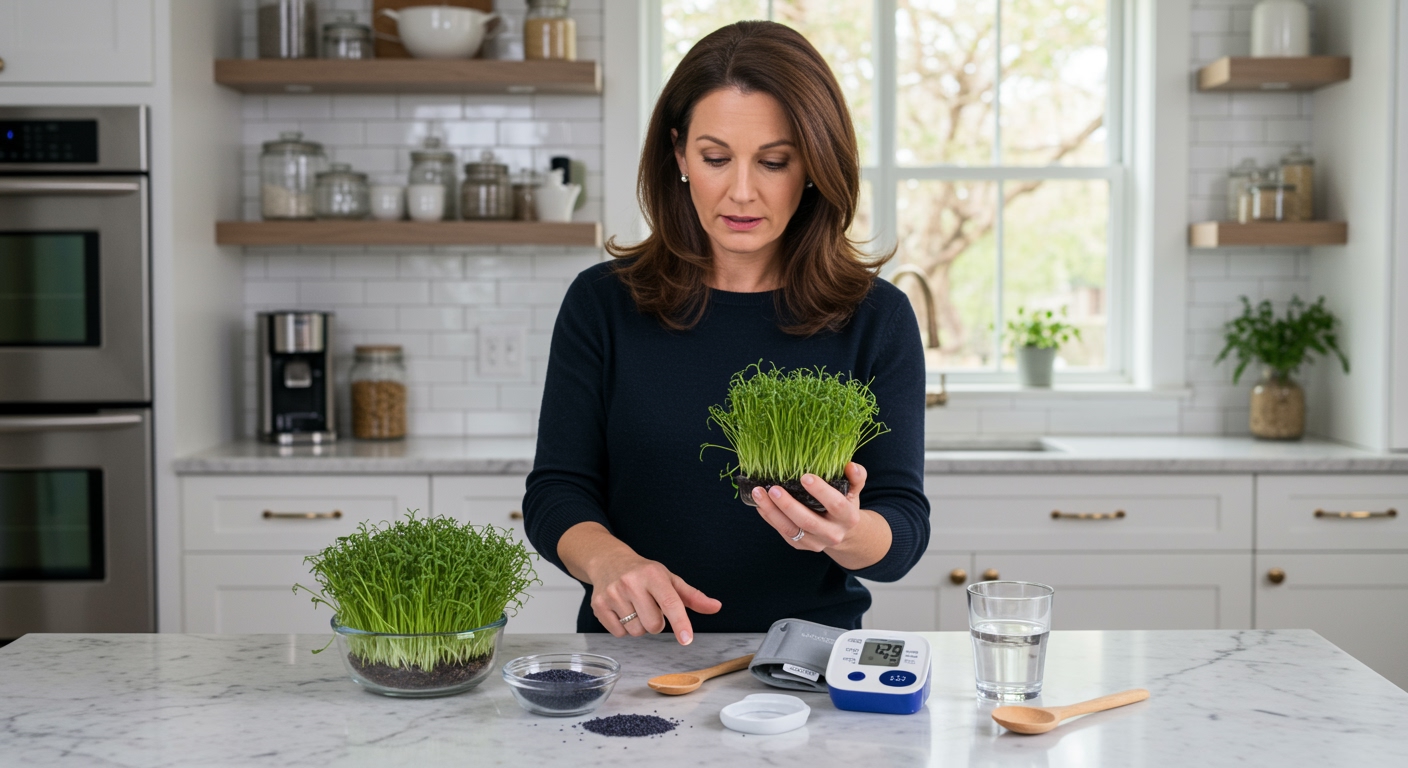✪ Key Takeaway: Poppy sprouts contain compounds that may lower blood pressure, potentially worsening hypotension in susceptible individuals.
Introduction
Your friend just told you about these amazing poppy sprouts that supposedly help with health issues.
You might be wondering if these tiny green shoots could actually make your already low blood pressure even worse.
Hi, I’m Abdur, your nutrition coach and today I’m going to explain exactly how poppy sprouts affect your blood pressure and whether you should avoid them if you have hypotension.
What Are Poppy Sprouts and How Do They Work?
Poppy sprouts are the young shoots that grow from poppy seeds when they germinate.
These tiny green plants contain various bioactive compounds that can influence your cardiovascular system.
The sprouts contain alkaloids and other plant chemicals that may affect blood vessel function.
When you eat poppy sprouts, these compounds enter your bloodstream and can influence how your blood vessels behave.
Some of these compounds have vasodilatory effects, meaning they can cause your blood vessels to relax and widen.
This relaxation of blood vessels naturally leads to a reduction in blood pressure because your heart doesn’t have to work as hard to pump blood through wider pathways.
✪ Fact: Poppy sprouts contain up to 10 times more bioactive compounds than mature poppy plants.
Can Poppy Sprouts Actually Lower Your Blood Pressure?
Research suggests that poppy sprouts do have hypotensive properties, meaning they can lower blood pressure.
The mechanism involves the relaxation of smooth muscle in your blood vessel walls.
When these muscles relax, your arteries and veins become wider, reducing the resistance against blood flow.
This process is similar to how many prescription medications work to lower blood pressure.
The compounds in poppy sprouts may also affect your nervous system in ways that reduce blood pressure.
However, the effect is generally mild compared to pharmaceutical interventions, but it can still be significant for people with already low blood pressure.
✪ Pro Tip: Always measure your blood pressure before and after trying new foods if you have hypotension.
What Happens When You Have Low Blood Pressure?
Low blood pressure, or hypotension, occurs when your blood pressure reading falls below 90/60 mmHg.
When your blood pressure is too low, your organs don’t receive enough oxygen and nutrients through your bloodstream.
This can cause symptoms like dizziness, fainting, fatigue, and brain fog.
Your heart tries to compensate by beating faster, but this doesn’t always solve the problem.
Adding foods that further lower blood pressure can make these symptoms significantly worse.
In severe cases, extremely low blood pressure can lead to shock, which is a life-threatening condition requiring immediate medical attention.
✪ Note: Blood pressure below 70/40 mmHg is considered dangerously low and requires emergency care.
Should You Avoid Poppy Sprouts If You Have Hypotension?
If you have diagnosed low blood pressure, you should be extremely cautious with poppy sprouts.
The blood pressure lowering effects can compound your existing condition and make symptoms worse.
Even small amounts might cause noticeable drops in blood pressure for sensitive individuals.
If you want to try poppy sprouts, start with tiny amounts and monitor your symptoms carefully.
Watch for increased dizziness, weakness, or any worsening of your usual hypotension symptoms.
It’s always best to consult with your healthcare provider before adding poppy sprouts to your diet if you have low blood pressure.
Your doctor can help you determine if the potential risks outweigh any possible benefits for your specific situation.
✪ Pro Tip: Keep a food and symptom diary to track how different foods affect your blood pressure levels.
What Are Safer Alternatives for People With Low Blood Pressure?
Instead of poppy sprouts, focus on foods that can help stabilize or raise your blood pressure naturally.
Foods with natural sodium content like celery, beets, and sea vegetables can be helpful.
Staying well-hydrated is crucial because dehydration can make low blood pressure worse.
Small, frequent meals help prevent the postprandial hypotension that occurs after eating large meals.
Foods rich in B vitamins and folate support healthy blood pressure regulation.
Consider incorporating more protein-rich foods and healthy fats that provide sustained energy without dramatic blood pressure changes.
Always work with a healthcare professional to develop a nutrition plan that supports your specific blood pressure needs.
The Bottom Line
Poppy sprouts can indeed worsen low blood pressure due to their natural hypotensive compounds.
When it comes to blood pressure, every small change matters, especially when you’re already dealing with hypotension.
I’d love to hear about your experiences with foods that affect your blood pressure, so please share your thoughts or questions in the comments below.
References
At NutritionCrown, we use quality and credible sources to ensure our content is accurate and trustworthy. Below are the sources referenced in creating this article:
- Medical Dialogues: Fact Check: Can Watermelon and Poppy Seeds Cure High BP and Insomnia
- PMC: Cardiovascular Effects of Plant Compounds
- Medical News Today: Poppy Seeds: Nutrition and Health Benefits





